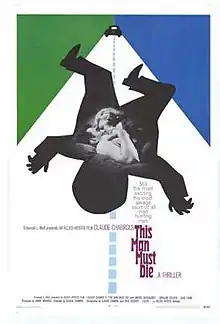This Man Must Die
This Man Must Die (French: Que la bête meure), also titled Killer! in the UK,[3] is a 1969 French–Italian psychological thriller film directed by Claude Chabrol. It is based on the 1938 novel The Beast Must Die by Cecil Day-Lewis, writing as Nicholas Blake. The story follows a widower who, obsessed with revenge after his only son is killed in a hit-and-run incident, tracks down the driver with the intent to kill him.
| This Man Must Die | |
|---|---|
 American film poster | |
| Directed by | Claude Chabrol |
| Written by | Claude Chabrol Paul Gégauff |
| Based on | The Beast Must Die by Cecil Day-Lewis |
| Produced by | André Génovès |
| Starring | Michel Duchaussoy Caroline Cellier Jean Yanne |
| Cinematography | Jean Rabier |
| Edited by | Jacques Gaillard |
| Music by | Pierre Jansen |
| Distributed by | Allied Artists Pictures Corporation (United States) |
Release dates | |
Running time | 110 mins. |
| Countries | France Italy |
| Language | French |
Plot
Returning from the beach, Charles Thénier's young son Michel is fatally hit by a sports car, whose driver escapes without stopping. Charles vows to have his revenge, keeping a journal in which he announces to kill the offender once he finds him.
The police investigation is fruitless. Charles thinks the guilty party may run a garage, since there is no record of a car going in for repairs. By chance, while pursuing this hunch, he discovers that the actress Hélène Lanson was the passenger in a car that was damaged on the day of his son's death. Adopting a pseudonym, he seduces her and discovers that the driver was her brother-in-law Paul Decourt. Hélène confesses that she once slept with Paul so Charles presses her to explain more of her anxiety about Paul but she refuses to add anything. He arranges a trip with Hélène to visit her sister's family in Brittany.
Charles discovers that Paul is detestable, cruel to his wife and hated by his teenage son Philippe. He has conflicting thoughts as to whether or not he will kill Paul but, although hesitatingly, rescues him from a cliff-fall. Philippe confides to Charles his own desire to kill his father.
Charles decides to kill Paul in a staged sailing accident and buys a boat for that purpose. However, while at sea, Paul pulls a gun on him and reveals that he has read Charles's journal and passed it to his solicitor to take to the police should something happen to him. After returning to the harbour, Paul throws Charles out of his house.
Charles appears to abandon his plan to murder Paul and drives away with Hélène. In a roadside restaurant, a television announcer reports Paul's death from poisoning and appeals for Charles and Hélène to return, which they do. Charles argues with the police that it would be foolhardy for him to kill Paul when he knew the journal would reach them. They contend that Charles has planned to use this argument to deflect their suspicions, and arrest him. However, Philippe enters and confesses to the murder.
Back at their hotel, Charles is weary and promises to tell Hélène the entire story the next day. She wakes to find his note explaining that Philippe has confessed falsely to the crime Charles himself committed. He tells her to share his confession with the police and that he will punish himself and never be seen again. While the film shows him sailing oceanward, Charles recites in a voice-over a line from the Vier ernste Gesänge by Johannes Brahms: "For that which befalls man befalls the beast, as the one dies, so dies the other".
Cast
- Michel Duchaussoy as Charles Thénier
- Caroline Cellier as Hélène Lanson
- Jean Yanne as Paul Decourt
- Anouk Ferjac as Jeanne Decourt
- Marc Di Napoli as Philippe Decourt
- Louise Chevalier as Madame Levenes
- Dominique Zardi as Police Inspector
- Maurice Pialat as Police Commissioner
Background
This Man Must Die opened in French cinemas on 5 September 1969,[1] achieving a total of 1,092,910 admissions in the domestic market.[4]
The Johannes Brahms song "Denn es gehet dem Menschen wie dem Vieh" from his Vier ernste Gesänge, eponymous for the film's title and used as a recurring motif, is sung by Kathleen Ferrier.
Reception
Writing for The New York Times upon the film's opening in New York, critic Roger Greenspun gave This Man Must Die a positive, though in parts restrained review. While calling it "surely one of the best new movies" which "adds wonderful moment to wonderful moment" and features "an idiomatic performance" by Jean Yanne, Greenspun also notes a shedding of "ironic strangeness" and a move towards the direct and sentimental in Chabrol's methods, and an ending whose images fall behind the director's usual technical capabilities.[2]
References
- de Baecque, Antoine (2021). Chabrol: biographie. Éditions Stock. ISBN 9782234078888.
- Greenspun, Roger (21 October 1970). "'This Man Must Die,' Chabrol Thriller, Begins Run". The New York Times. Retrieved 11 May 2023.
- Goble, Alan, ed. (1999). The Complete Index to Literary Sources in Film. Bowker-Saur. p. 43. ISBN 9783598114922.
- "Que la bête meure". JP Box-Office (in French). Retrieved 9 September 2019.